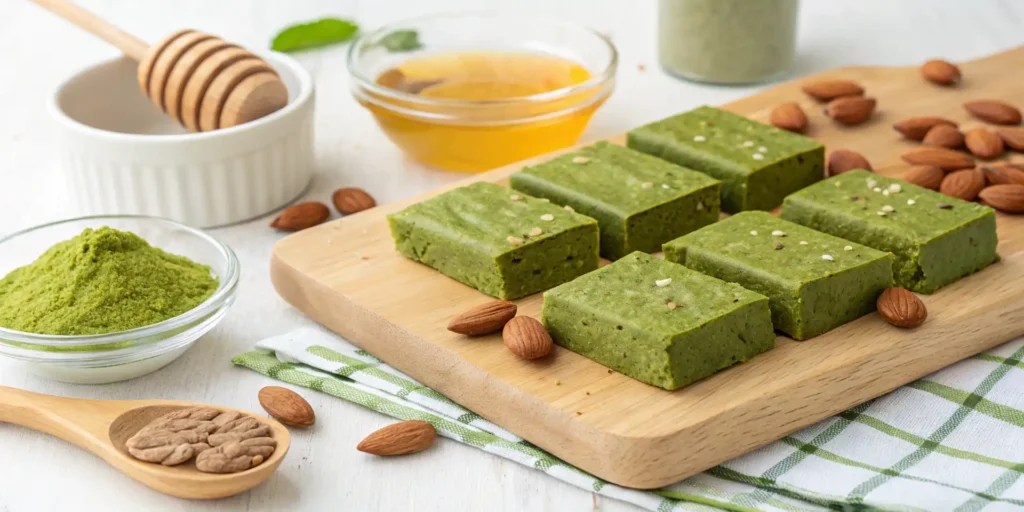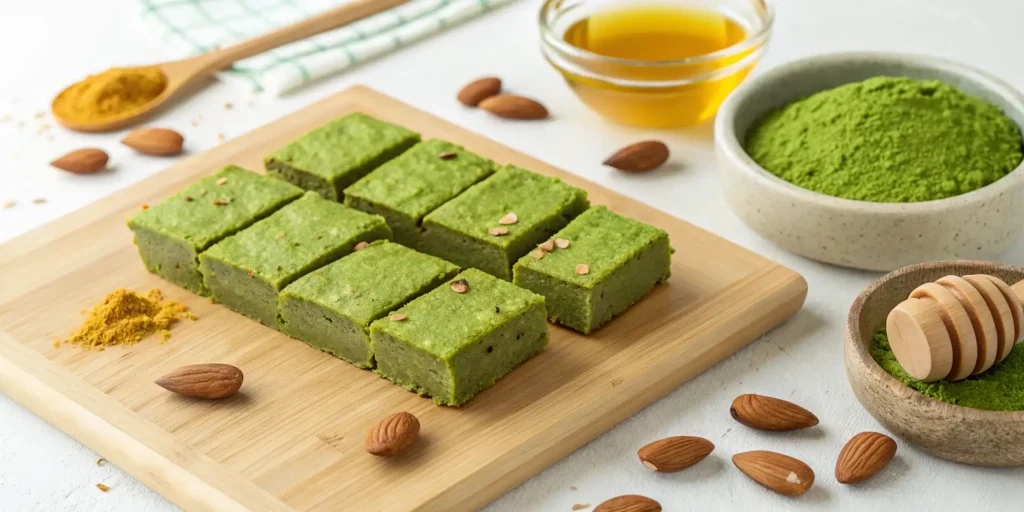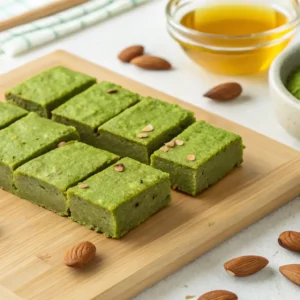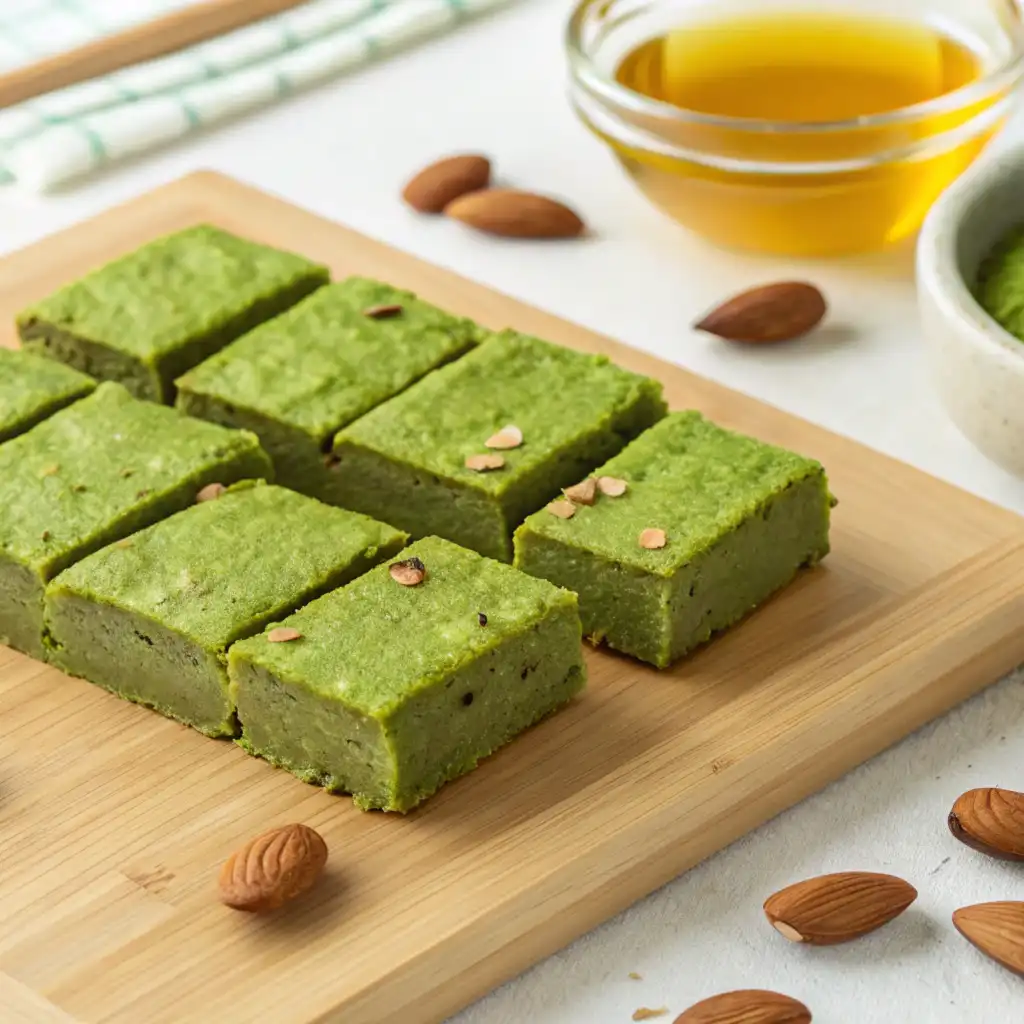Matcha protein bar is the ultimate fusion of health and taste. Combining the earthy flavors of matcha with the energy-boosting properties of protein, these bars are not only delicious but also packed with nutrients. Whether you’re looking for a quick snack, post-workout fuel, or a guilt-free dessert, matcha protein bars tick all the right boxes. Let’s dive into why these bars are gaining so much popularity and how you can enjoy their benefits.

Table of contents
Why Matcha Matcha Protein Bar Is Unique
Nutritional benefits of matcha
Matcha, a finely ground green tea powder, is celebrated for its rich nutrient profile. It contains powerful antioxidants, including EGCG (epigallocatechin gallate), which combat oxidative stress and inflammation. Matcha also provides a moderate caffeine boost, paired with L-theanine, an amino acid that promotes calm focus. When combined with protein, matcha creates a snack that energizes your body and supports overall well-being.
Key Benefits of Matcha:
| Nutrient | Benefits |
|---|---|
| Antioxidants | Fights free radicals, promotes health |
| L-Theanine | Enhances focus and relaxation |
| Chlorophyll | Detoxifies and rejuvenates the skin |
| Vitamins A, C, E | Boosts immunity and energy levels |
Protein’s role in fitness and health
Protein is essential for repairing and building muscles, regulating enzymes, and maintaining energy levels. Adding protein to matcha bars makes them a fantastic option for fitness enthusiasts who need sustained energy and effective muscle recovery. Whether you follow a vegan or non-vegan diet, matcha protein bars can fit seamlessly into your lifestyle.
Synergistic benefits of matcha + protein
Combining matcha with protein powder results in a powerhouse snack. While matcha helps with mental clarity and antioxidants, protein ensures you’re full for longer and aids in muscle growth. Together, they provide a balance of nutrients that cater to both physical and cognitive needs.
Ingredients for the Perfect Matcha Protein Bar
List of common ingredients
Matcha protein bars are made using simple yet nutrient-packed ingredients. Here’s what you’ll typically need:
- Matcha Powder: Provides antioxidants and flavor.
- Protein Powder: Whey or plant-based options.
- Sweeteners: Honey, maple syrup, or natural sweeteners for balance.
- Nuts and Seeds: Almonds, chia seeds, or flaxseeds for crunch and fiber.
- Binders: Nut butter or coconut oil to hold the bars together.
Choosing high-quality matcha powder
The quality of your matcha can make or break your protein bars. When shopping for matcha, opt for:
- Ceremonial Grade: Ideal for a pure, vibrant flavor.
- Bright Green Color: Indicates freshness and nutrient density.
- Origin: Japanese matcha is typically superior in quality.
Sweeteners and binders: Healthy choices
Natural sweeteners like honey, agave, or stevia provide sweetness without the crash of refined sugar. Nut butters such as almond or cashew butter add both richness and binding qualities. This ensures your bars stay intact while being flavorful and nutritious.
Step-by-Step Guide to Making Matcha Protein Bars

1. Preparing ingredients
Start by measuring your dry ingredients: matcha powder, protein powder, and any additional items like oats or nuts. In a separate bowl, mix your wet ingredients, such as nut butter and honey. This step ensures even mixing when you combine them.
2. Mixing and shaping
Gradually fold the dry ingredients into the wet mixture until a dough forms. If the mixture feels too dry, add a splash of almond milk or water. Spread the dough into a lined tray and press firmly to create an even layer.
3. Storing for freshness
Refrigerate the tray for at least 2 hours or until the mixture sets. Once firm, cut into bars and store in an airtight container. Proper storage keeps the bars fresh for up to a week.
Why Choose Homemade Over Store-Bought
Cost-effectiveness
Making matcha protein bars at home can save you money compared to store-bought options. Plus, you control the quality of ingredients, ensuring they’re free from artificial additives and preservatives.
Avoiding additives and preservatives
Many commercial protein bars contain hidden sugars, artificial flavors, and stabilizers. By preparing them at home, you know exactly what goes into your snack, making it healthier and more aligned with your dietary preferences.
Customization options
Homemade matcha protein bars offer endless possibilities for personalization. Want a vegan version? Use plant-based protein powder. Craving a nutty crunch? Add almonds or pistachios. You can even experiment with chocolate chips for a dessert-like touch—check out this delicious vegan chocolate matcha energy bars recipe for inspiration.
Flavor Variations and Add-ons
Adding nuts, seeds, or chocolate chips
Enhance your matcha protein bars with nutrient-dense additions like nuts, seeds, or even chocolate. Almonds, cashews, and walnuts add healthy fats, while chia or flaxseeds contribute omega-3s and fiber. For a sweet treat, consider mixing in dark chocolate chips for a burst of flavor and antioxidants.
Matcha and tropical flavors (e.g., coconut)
For a tropical twist, pair matcha with ingredients like shredded coconut or dried pineapple. Coconut not only complements matcha’s earthy flavor but also adds texture and healthy fats. You can find creative ways to incorporate this in recipes like matcha granola bars for a tropical snack on the go.
Experimenting with protein types (e.g., vegan)
Not all protein powders are created equal. Plant-based options like pea, hemp, or soy protein are perfect for vegans or those with dietary restrictions. These powders blend well with matcha and cater to various flavor profiles. Experimenting with different types ensures your bars suit your taste and dietary goals.
Serving and Storage Tips
Ideal serving sizes
Matcha protein bars are dense in nutrients, so a small piece goes a long way. Depending on the recipe, one bar (about 40–50 grams) is often enough to satisfy hunger and keep you energized. Adjust portion sizes based on your activity levels or dietary needs.
Proper storage to retain freshness
To keep your bars fresh and flavorful, store them in an airtight container. Refrigeration works best, especially if your recipe includes perishable ingredients like nut butter or milk. For extended storage, consider freezing your bars; they’ll last up to three months and can be thawed as needed.
Health Benefits of Matcha Protein Bars
Sustained energy and focus
Matcha protein bars provide an excellent balance of slow-digesting protein and the steady energy boost of matcha’s caffeine. Unlike coffee, matcha’s L-theanine ensures calm focus, making these bars ideal for long workdays or pre-workout snacks.
Weight management and muscle repair
The protein content in these bars supports muscle recovery after workouts, while the fiber from ingredients like oats or chia seeds promotes satiety. This combination can help manage weight by curbing unhealthy snacking.
Antioxidant properties of matcha
One standout benefit of matcha protein bars is their high antioxidant content. Matcha’s EGCG not only fights free radicals but also supports heart health and reduces inflammation. Combining this with protein and other wholesome ingredients makes for a health-boosting snack.
Frequently Asked Questions (FAQs)
Yes, matcha protein bars can easily be made vegan by using plant-based protein powders and natural sweeteners like maple syrup. Many recipes, such as this matcha oatmeal bars recipe, cater to vegan diets.
The ideal number depends on your nutritional needs. For most people, one or two bars daily is sufficient as a snack or post-workout treat. Be mindful of your protein and calorie intake to maintain a balanced diet.
Absolutely! Honey can be replaced with alternatives like agave syrup, maple syrup, or date paste. These substitutes maintain the bar’s texture and sweetness while catering to dietary preferences.
Look for matcha at specialty tea shops or online retailers that specify “ceremonial grade” for drinking or “culinary grade” for cooking. Japanese-origin matcha is widely regarded as the best quality.
Yes, matcha contains caffeine, but its effects are balanced by L-theanine, which provides sustained energy without the jitters. Each bar typically contains less caffeine than a cup of coffee.
Yes, matcha protein bars can be made gluten-free by using certified gluten-free oats and ensuring all other ingredients, like protein powder and sweeteners, are also gluten-free. For a gluten-free recipe, check out this matcha bars recipe.
Conclusion
Matcha protein bars are a versatile, nutritious snack that fits into a variety of lifestyles. Whether you make them fuel your workouts, satisfy your sweet tooth, or enjoy their health benefits, they are a delightful addition to your diet. Ready to try? Get creative with ingredients and enjoy a homemade snack that truly stands out.

Matcha Protein Bar Recipe
Ingredients
- 2 tbsp matcha powder
- 1 cup protein powder plant-based or whey
- ¼ cup almond butter
- ¼ cup honey or maple syrup
- ½ cup oats
- 2 tbsp chia seeds
- ¼ cup dark chocolate chips optional
Instructions
- Mix the dry ingredients: matcha powder, protein powder, oats, and chia seeds.
- In a separate bowl, combine almond butter and honey/maple syrup until smooth.
- Gradually fold the wet mixture into the dry ingredients. Add chocolate chips if desired.
- Press the mixture into a lined tray and refrigerate for 2 hours.
- Slice into bars and enjoy!
Notes
- For a nut-free option, substitute almond butter with sunflower seed butter.
- Store bars in the refrigerator for up to 1 week or freeze for up to 3 months.

